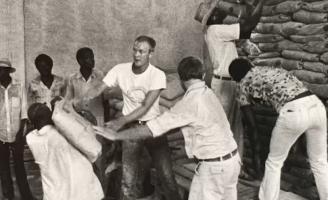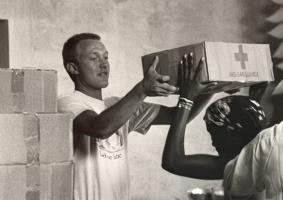Marc Blaser was born on 2 December 1964 in Bern. He went to grade school and high school in Bern, completing his secondary studies in 1985 at the age of 20. He liked travelling – he visited various countries in North America and Europe, not to mention Kenya, in his youth – and enjoyed playing sports and the clarinet. He also shared a passion for shortwave radio with his father: they both earned their licence in 1982, after which they immediately bought their own transmitter. Marc learned Morse code and even taught a six-month course on it for the Swiss army while still in high school. He enjoyed the camaraderie of the shortwave community, and one of his peers encouraged him to use his skills at the ICRC. Looking to fill a four-month gap before starting his military service, Marc applied for work there in February 1985.
Marc was hired by the ICRC for a four-month mission to Angola starting in October 1985. He was the youngest of the organization’s 70 expatriate employees in the country, and one of four radio operators. He and his three colleagues were responsible for radio communications among the ICRC’s six sites in Angola. Marc’s first posting was to Luanda, where he had to master Morse code in French so that he could quickly translate piles of telegrams written in that language. He then went to Huambo, where he set up radio equipment and made trips to various outposts to do technical repairs. Light-hearted by nature, Marc quickly came to be appreciated among his colleagues for his kindness and professional skills. He loved to be of help and cherished the opportunity to get away from his desk from time to time.
Marc’s next stop was the port city of Lobito, the main entry point for the relief supplies that the ICRC shipped to Angola. Given the unreliability of the country’s train service, much of this aid was forwarded by air to destinations around the country, and radio communications were a crucial part of that process. Marc enjoyed his work, and in a letter to his supervisor expressed interest in doing a future mission. But on 16 December 1985, a couple of weeks after his 21st birthday, Marc was shot and killed near Lobito in an apparent robbery attempt.
In keeping with the humanitarian impulse that drove Marc, his parents responded to his death by setting up a charitable foundation in his name. Since building its first school in Togo in 1987, the Marc Blaser Foundation has branched out and now runs projects in the areas of nutrition, health and education in 12 countries. The foundation’s roots keep spreading, and Marc’s legacy lives on.


